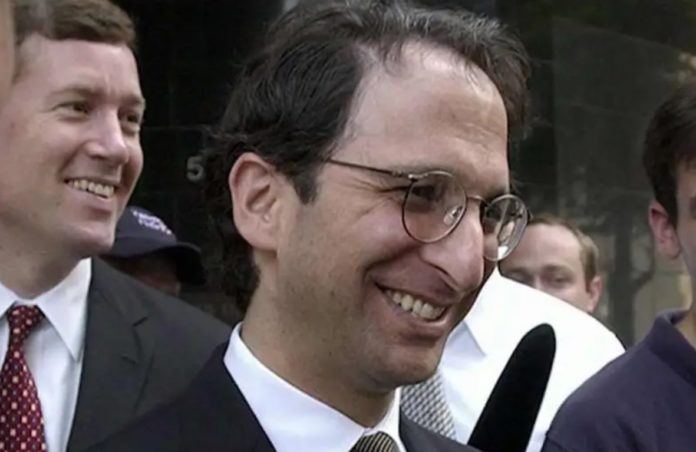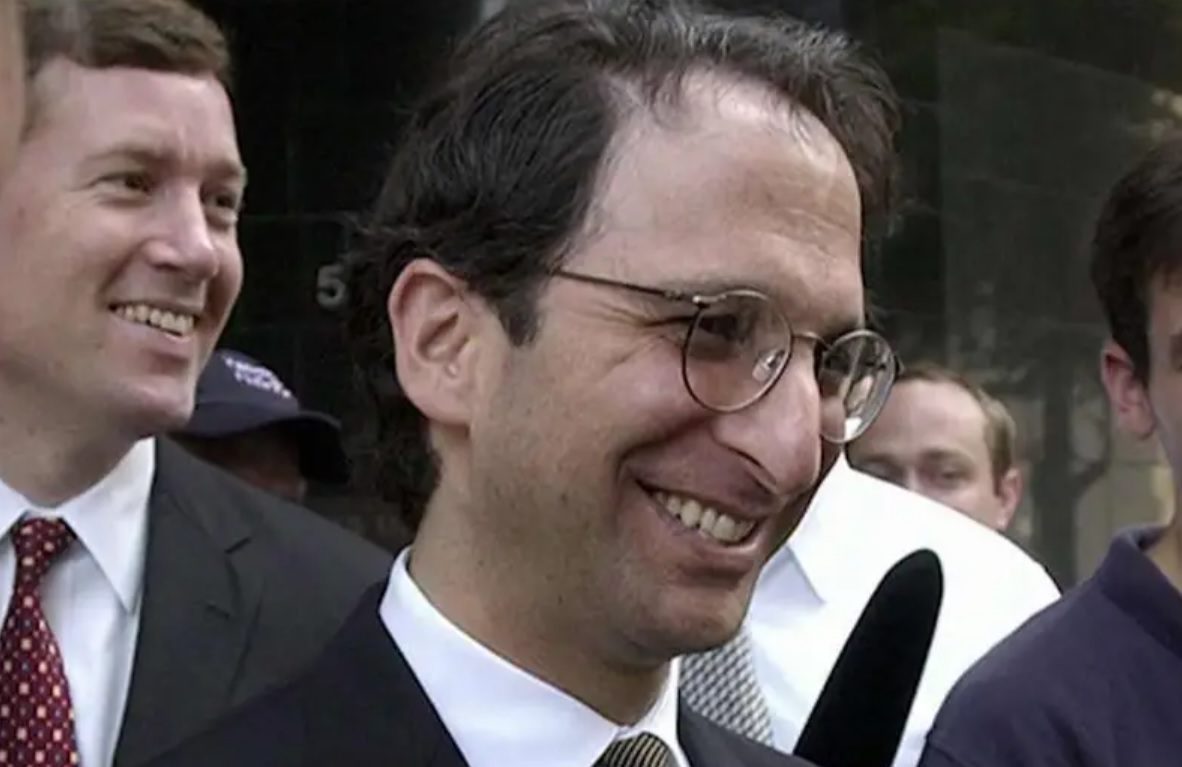Andrew Weissmann is right in the middle of some of the most corrupt prosecutions in the history of the DOJ. Today we have more on his corrupt and unethical actions that have gone unimpeded for over three decades.
SEE ALSO:
Michael Sessa sits in prison today. He has been in prison for 30 years due to Weissmann’s actions in his case in the early 1990’s. Weissman’s actions in Sessa’s case led to the most corrupt prosecution in the history of the DOJ.
Sara Carter shared an article that was written by attorney David Shoen in early 2021. This article is an excellent summary of Andrew Weissmann’s actions in the Michael Sesssa case which took place in the early 1990’s [emphasis added below].
An examination of Weissmann’s work as a prosecutor indicates quite emphatically that there is simply no limit to the kind or degree of prosecutorial misconduct in which he has been willing to engage. The examples of Weissmann’s misconduct and the lives he has ruined or cost as a result could fill a book. Indeed, a great deal has been written about his misconduct in the Enron and Arthur Anderson cases that ruined so many lives and his actions there truly were reprehensible. But a consideration of two cases he prosecuted almost thirty years ago, as a federal prosecutor in the Eastern District of New York stand alone in demonstrating his prosecutorial misconduct and government corruption under his watch that is unparalleled.
In the early 1990s Weissmann, John Gleeson, and others formed a team in the federal prosecutors’ office in Brooklyn, NY that prosecuted alleged organized crime figures. This group’s record, as reported by other prosecutors and informants who worked with them, indicates that they apparently decided for themselves that the ends justified any means they decided to use in their work, no matter the ethical transgressions they would commit along the way.
Weissmann was not satisfied in simply prosecuting defendants against whom there actually was evidence of a crime; nor could he play by the rules. That has been the hallmark of his entire career. His prosecution of two men in particular during the early 1990s demonstrates the point in ways that one would have thought unimaginable, if they were not fully documented and undeniable.
These two men, Michael Sessa and Victor Orena, have been in prison for thirty years, serving life sentences without the possibility of parole, after being convicted through the most outrageous examples of Weissmann’s misconduct on record. I cannot possibly cover in the space allotted here all of the examples of the outrageous prosecutorial misconduct in which Weissmann and his colleagues engaged in these cases; but consider just these examples just from Michael Sessa’s case. All of the facts below are unequivocally established by documents I obtained in investigating these cases and from interviews I have conducted with many witnesses, including top informants who worked with Weissmann on the cases.
Weissmann and his colleagues claimed that there was an internal feud within the so-called Colombo organized crime family in New York. It is now clear that this “war” was a battle initiated by perhaps the most corrupt FBI agent in history, in league with government informants. The agent chose sides in the family and pitted one faction against another. The agent worked in tandem with a brutal mafia killer, Gregory Scarpa, who admitted to over 50 murders and actually committed many more. The agent effectively gave Scarpa a license to kill and, according to Scarpa’s son, who I have interviewed extensively, the agent participated in crimes with Scarpa (and his son), including several murders, and was paid for his help in providing information to Scarpa about his next victims. Ultimately the agent was charged with several murders and with helping on others. All of this took place while the agent was Weissmann’s case agent.
In fact, we now know that in 1992, when Scarpa was arrested on a gun charge in the middle of his killing spree, the corrupt agent went to Weissmann and his colleagues to get Scarpa out of the charges and they intervened, continuing his license to kill. And killing is exactly what Scarpa did. He did not confine his killing to fellow mafiosos. Rather, through the license Scarpa effectively was given, completely innocent civilians were killed, including a 17 year old boy and a doctor.
When Weissmann ultimately was confronted with indisputable evidence of the corrupt relationship between the agent and Scarpa, according to a former federal prosecutor involved with the cases, Weissmann instructed her that the government had no obligation to disclose this corruption to the defendants in any of the cases they were working, including cases in which Scarpa had been the source of information against the defendant and in which the corrupt agent testified under oath. That is exactly the scenario that unfolded in Michael Sessa’s case. Weissmann alleged that Sessa killed a man named Collucio and had him arrested. Sessa, knowing he had nothing to do with this, self-surrendered to fight the charge, without knowing the kind of government misconduct he was about to face.
In the proceedings leading up to Michael Sessa’s trial, Weissmann had Sessa’s counsel of choice disqualified and then rushed Sessa to trial with new lawyers. Sessa’s lawyers asked for the identity of the government’s primary source of information against him, identified by the government only as a Confidential Source. Weissmann refused to disclose the identity and assured the judge it was not necessary for the defense to know. During the investigation after Sessa was tried and convicted, we learned that that source was none other than Gregory Scarpa.
Sessa’s lawyers in discovery asked that the NYPD investigative file be produced. Weissmann and his partner assured the judge that they knew their obligations to disclose evidence favorable to the defendant or that would impeach any government witness and they told the judge that they had examined the NYPD file and there was no such information in it. This was an outrageous lie of the first order. We obtained a copy through a source during the post-conviction investigation. In truth it provides an abundance of exculpatory evidence that was critically important. For example, the NYPD investigation identified 10-12 suspects in the Collucio murder, none of whom was Michael Sessa, and one of whom was none other than Greg Scarpa. It was filled with other evidence consistent with Sessa’s innocence…
…Sessa’s defense team had reason to believe that one of Weissmann’s primary witnesses against Sessa had been arrested for heinous crimes, including kidnapping, rape, sodomy, and more – crimes that would have undercut his credibility and that the defense was entitled to know about. Weissmann denied it all. In our investigation we learned that the suspicions were well founded and Weissmann had blatantly lied. This same witness testified that he had received no money from the government in connection with his testimony, save for food and lodging. In 2012, the corrupt agent admitted that the witness had in fact been paid $120,000 in connection with his work for the government as Weissmann well knew and failed to disclose, listening silently instead as the witness lied…
Above is a picture of Gregory Scarpa, mentioned above, this man is responsible for at least 60 murders and was the star witness for Weissmann in the Michael Sessa case. Weissmann kept his identity hidden during the case.
None of Weissmann’s actions in the Sessa case prevented Weissmann from running the Enron Task force with Robert Mueller which led to over 80,000 Arthur Andersen professionals needlessly losing their jobs in the early 2000s.
None of Weissmann’s actions prevented four Merrill Lynch professionals from facing time in prison, one in solitary, who were later found innocent in the mid-2000s.
None of this prevented Weissmann from leading the Mueller witchhunt in its attempted coup of the President of the United States. The list of unethical and arguably criminal actions by Weissmann in the Mueller witchhunt is as well unending.
This was the beginning of the many corrupt acts attributable to Andrew Weissmann and the DOJ over the past three decades.
Weissmann today is still trying to get President Trump.
Much more to come…




